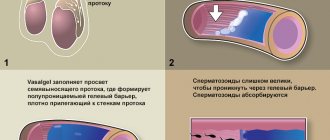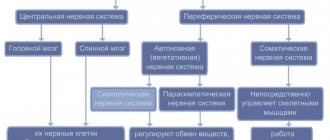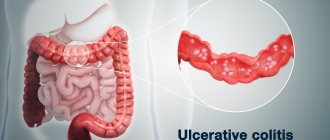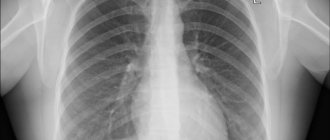Gynecologist appointment price
Consultation with a gynecologist of the highest qualification category with the primary purpose of treatment
1800 rub.
Emergency contraception is one of the least harmful ways to prevent pregnancy after unprotected sexual intercourse. The very name of this procedure suggests that resorting to it often is at least undesirable. Some couples from time to time forget about the need to take care of contraception. This is where emergency contraception comes to the rescue.
First of all, you should determine on what day of the menstrual cycle sexual intercourse took place. In the first and last weeks of the menstrual cycle, it is quite possible to stop taking medications, because ovulation occurs in the middle of the cycle. This rule applies exclusively to those representatives of the fair sex whose menstrual cycle is regular.
The consequences of taking emergency contraception can be extremely unpleasant, so you should not use them unless necessary. You should not take emergency contraception during scheduled use of hormonal contraceptives (in the first weeks, when the contraceptive effect is still low). During this period, it is better to use non-hormonal agents. It is also not recommended to use emergency contraception while breastfeeding.
If you had unprotected sex and you think there is a possibility of pregnancy, but you are not ready for it now? Just call us! Choose the clinic closest to you and make an appointment with a gynecologist. Our phones:
- Clinic on Shchelkovskaya 8 (495) 221-21-14 (Eastern Administrative District: Izmailovo, Golyanovo, Pervomaiskaya, Shchelkovskaya, Partizanskaya)
- Clinic in Tekstilshchiki 8 (499) 322-23-97 (South-Eastern Administrative District: Volgogradsky Prospekt, Ryazansky Prospekt, Lyublino, Kuzminki, Pechatniki)
- Clinic in Maryina Roshcha 8 (495) 221-21-16 (NEAD: VDNH, Savelovskaya, Rizhskaya, Alekseevskaya, Sushchevsky Val)
- Clinic in Mitino 8 (495) 212-90-47 (Northwest Administrative District: Pyatnitskoye Highway, Mitino, Dubravnaya, Pavshino, Pavshinskaya Poyma, Krasnogorsk)
Emergency contraception and termination of pregnancy. What is the difference?
Emergency contraception is a way to avoid pregnancy during ovulation and fertilization. Thus, such drugs suppress ovulation and prevent the germ cells from uniting or prevent the fertilized egg from attaching to the uterus. It takes approximately 3 days for the egg to travel to the uterus. The same amount is needed to attach to its walls. This is why it is not advisable to use emergency measures after the 6-day period. In this case, termination of pregnancy will be required.
How effective is it?
It is impossible to predict the time of ovulation, so the pill should be taken as soon as possible after unprotected sex.
In an open-label clinical trial of women receiving the emergency contraception ulipristal acetate (ellaOne) between 48 and 120 hours after unprotected intercourse, the pregnancy rate was 2.1%.
The effectiveness of the pill may decrease as weight or body mass index increases, but all women should take emergency contraception as soon as possible.
In addition, there are many interactions between the tablet and other medications that may affect the concentration of the active substance in the body. Before taking emergency contraception, you should carefully read the instructions for the drug.
In any case, one pill every other day may not be as effective as regular contraception and should never be replaced.
In addition, it does not protect against sexually transmitted diseases.
Emergency contraception
Women often purchase such drugs without first consulting a doctor. This is extremely undesirable, because only a specialist can assess the consequences of using a particular drug and prescribe the one that is ideal for you. Only in this case will you be sure that preventing pregnancy will not cause irreparable harm.
Some of the most common drugs are those of the old generation. These drugs have quite a lot of side effects. They should usually be taken within a period of 72 hours (after sexual intercourse). The second tablet is taken 12 hours later. The earlier the drug was taken, the less chance that pregnancy will occur.
There are also products that need to be taken only once, as well as those that are taken in two doses of several tablets.
How does the morning after pill work?
The next-day pill can be taken at any time during the menstrual cycle, but within 72 hours (Escapelle) or 120 hours (ellaOne) after unprotected sex. The mechanism of action is to prevent or delay ovulation by suppressing the production of luteinizing hormone (LH).
It is extremely important to note that the pills are not effective if ovulation has already occurred. Additionally, taking the pill does not mean that a woman is “safe” from unwanted pregnancy for the rest of the month. It is imperative to use a reliable mechanical means of contraception, such as a condom. It is risky to rely on coitus interruptus or the day counting method.
The pill will not terminate a pregnancy if it has already occurred. No side effects on the fetus were observed, but the results of animal experiments are insufficient to assess its toxicity.
The morning after pill is not the same as the pill that causes miscarriage or abortion.
The morning after pill contains the active ingredients usually found in birth control pills, only in much higher doses.
Side effects
The tolerability of a particular drug is determined primarily by individual characteristics. Side effects include: dizziness, headaches, nausea and vomiting, pain in the mammary glands, etc. It must be taken into account that the presence of side effects such as vomiting and nausea can significantly reduce the effectiveness of the drug.
Side effects also include uterine bleeding, menstrual irregularities, diarrhea and allergic reactions. Another important fact is that you need to keep in mind that estrogens contained in some drugs can negatively affect the fetus if pregnancy occurs. In other cases, emergency contraception is not an indication for abortion. In any case, examination and consultation with a specialist are necessary.
As mentioned above, emergency contraceptive pills are a means that can only be used in rare, exceptional cases. It is allowed to take such drugs no more than three times during the year.
How to avoid pregnancy
A brief overview of the scientific facts about emergency contraception:
- You need to take the emergency pill within 3 days/72 hours (Postinor, Escapelle) or 5 days/120 hours (Zhenale, Gynepriston) after unprotected sex for them to be effective. The sooner you take them, the better the result will be (maximum - up to 95.7%).
- The IUD can be inserted up to 5 days after unprotected intercourse or up to 5 days after the earliest period of ovulation.
- When taking 72-hour birth control pills, be aware that they may give you a headache or stomach pain, nausea, or vomiting.
- The emergency contraceptive pill may make your next menstrual period earlier, later, or significantly more painful than usual.
- In case of vomiting within 2 hours after taking Postinor, Escapel or within 3 hours after taking Zhenale, Ginepristone, consult a doctor, as you will need to take a new dose of the drug or install a spiral.
- If these methods do not work and an unplanned conception does occur, it is possible to solve the problem in the early stages through a medical abortion in a clinic.
The main methods of protection in emergency cases in reproductive medicine are: copper-containing intrauterine devices (IUDs) and pills (ECP, “72 hours after”). Gynecologists consider “copper” IUDs to be the most effective form of emergency contraception. It prevents fertilization by causing a chemical change in the structure of sperm and eggs before they meet, as well as shifts in the structure of the endometrium, preventing the implantation of a fertilized egg. Of the “after-act” pills, the best are those that contain mifepristone (Zhenale, etc.).
⚠ We recommend that you consult with a gynecologist-endocrinologist at our clinic or anyone else at your request about the possibility of using these funds and what would be better specifically in your case.
Emergency contraceptive pills
Drugs for “fire” cases save from pregnancy by preventing or delaying ovulation, but do not cause abortion. At the same time, even the best emergency contraception cannot terminate an existing pregnancy or harm a developing embryo.
Of the tablets taken within 72 hours after the act, the leading role belongs to 3 groups:
- Postinor and Escapel (contain levonorgestrel);
- Zhenale and Ginepristone (containing mifepristone);
- Combined oral contraceptives (COCs) consisting of ethinyl estradiol plus levonorgestrel.
How often and how much can you take emergency contraception?
Some women use pregnancy pills repeatedly after intercourse for any of the above reasons or as a primary method of contraception. In such situations, further counseling of the patient is necessary regarding which options for regular contraception may be suitable for her.
Repeated use of the 72 hour pill may be harmful to women. When used frequently, they can lead to increased side effects such as menstrual irregularities, although their repeated use poses no known health risks for many. Even the best emergency contraceptive pills have been found to be less effective in obese women, but there are no safety concerns. Obese women cannot be denied this method when they really need it.
Considering the rather significant impact of such drugs (especially Postinor and Escapella) on hormonal levels and the functioning of the uterus and ovaries, it would be useful to carry out some preventive measures aimed at normalizing and stabilizing the activity of these organs. We suggest paying attention to a procedure such as massage of the appendages and uterus, which has a number of advantages and allows you to achieve the desired effect without taking hormones and other medications. This will make it possible in the future to avoid ectopic and frozen pregnancies, other early and late complications when carrying a child (preeclampsia, ICI, threat of miscarriage and fetal hypoxia).
IUD for pregnancy
The second effective means of emergency contraception is the IUD. How does the IUD work as protection against pregnancy after intercourse?
An intrauterine device is a small T-shaped plastic and copper medical device that a gynecologist inserts into the uterus (womb). It releases copper to stop the egg from implanting in the uterus or fertilization.
For emergency protection, an IUD can be inserted up to 5 days after unprotected sex or up to 120 hours after the earliest time you could ovulate (release an egg) to prevent an unwanted pregnancy. You can also keep it as a permanent method of contraception. A copper IUD should not be inserted after sexual assault because the woman may be at high risk of sexually transmitted infections such as chlamydia and gonorrhea.
How effective is an IUD in preventing pregnancy? Inserting the IUD into the uterus within the recommended time frame is a highly effective method of emergency contraception—less than 1% of women using it become pregnant. This product is more effective at preventing unwanted pregnancy after unprotected sex than the “after-coital birth control pill.”
Who can use an IUD? Most women can use this technique if desired and there are no contraindications. However, the method may not work if you have:
- untreated sexually transmitted infection (STI) or pelvic infection,
- problems with the uterus or cervix,
- unexplained bleeding between periods or after sex,
- you are pregnant,
- There is a risk that you may already be pregnant.
The product is safe during breastfeeding - its use in emergency cases will not affect milk supply and lactation.
Emergency contraception procedure at Diamed clinics
Our clinic specialists will help you avoid the dangerous consequences of emergency contraception. Here you can take all the necessary tests, including a blood test for hCG. An experienced doctor will examine you, prescribe the drug and explain how to take it correctly.
In addition, experienced doctors will monitor after treatment and help you choose the optimal method of planned contraception. The guarantee of contraception in Diamed clinics is truly one hundred percent, because the prescription of drugs here is carried out by professionals who have extensive experience in the field of gynecology.
Contraindications to taking abortion pills
There is a general list of contraindications for taking any abortifacient drugs:
- ectopic pregnancy;
- pregnancy period is more than 7 weeks;
- pregnancy while taking hormonal contraceptives;
- renal and liver failure;
- the patient's age is less than 18 years;
- disorders of the blood coagulation system, vascular pathologies;
- diseases of the female reproductive system - tumors of any nature, endometriosis, tissue inflammation;
- allergies, intolerance to individual components of the drug;
- epilepsy;
- pulmonary pathologies – bronchial asthma, chronic obstructive pulmonary diseases;
- diseases of the cardiovascular system - arterial hypertension, heart rhythm disturbances, chronic heart failure;
- inflammatory diseases of the gastrointestinal tract - ulcers, colitis, gastritis.
Medication abortion drugs should be used with caution in women over 35 years of age, as well as in smoking patients. A comprehensive examination before the procedure allows you to accurately determine the gestational age and the place of attachment of the fertilized egg. Also, during a medical consultation, diseases of the genital tract and chronic diseases are excluded.
The risk of complications increases many times over, and the effectiveness of abortifacient drugs decreases if improper drug interactions are allowed. For example, it is unacceptable to use abortion pills and nonsteroidal anti-inflammatory drugs (NSAIDs) at the same time. Even seemingly harmless acetylsalicylic acid can change the effect of drugs.
The gynecologist will tell the patient about all the risks and features of using drugs for medical removal of the fertilized egg. If an unwanted pregnancy occurs during breastfeeding, the young mother should interrupt breastfeeding for 7-14 days. This is due to the penetration of abortifacient drugs into breast milk. To preserve milk during this period, it should be expressed regularly. You can feed the baby with a special formula at this time.
In addition, when the procedure is performed in a clinic, the woman receives a guarantee that the abortion will be completed. If for any reason it is not possible to achieve complete removal of the fetus from the uterine cavity, additional surgical curettage is necessary. In the case of home use of abortifacient drugs, the patient must pay for this procedure independently.
If the problem arose after a medical abortion, the completion of the procedure is carried out free of charge with maximum care for the patient.
Bloody discharge when taking birth control pills and pregnancy
If birth control pills are taken regularly and there are no other factors interfering with the absorption of hormones, there is no need to worry about pregnancy, even if you do experience breakthrough bleeding. This is a common symptom, especially when starting pills, but it does not affect the doses of hormones that enter the body. Thus, the effectiveness of the tablets is the same as in the absence of bleeding.
Combined oral contraceptives (COCs)
These contraceptives simultaneously contain two important hormones - estrogen and progestin (progesterone) and their derivatives in different proportions. Both sex hormones are produced in the ovaries.
If we look at combined contraceptive drugs, it becomes clear how they were created - specialists selected concentrations and combinations that were close to the natural content in women of different ages and with different hormonal status.
Based on the combination of types of hormones, COCs are mono-, bi- and triphasic. Each of these groups includes different drugs.
| Type of COC | Characteristic | Active substances (examples of drugs) |
| Monophasic tablets | The hormone content in all tablets is the same and does not depend on the time of administration | Desogestrel and ethinyl estradiol (Regulon); Dienogest and ethinyl estradiol (Siluet, Janine); Ethinyl estradiol and gestodene (Miniziston, Rigevidon, Logest, Lindinet) |
| Biphasic tablets | The percentage dose of estrogen in all tablets is unchanged, and the gestagen content varies depending on the period of the menstrual cycle | Norethisterone and ethinyl estradiol (Binovum); Levonorgestrel and ethinyl estradiol (Binordiol, Adepal, Biphasil); Chlormadinone acetate and ethinyl estradiol (Neo-Eunomin) |
| Three-phase tablets | The dose of hormones varies depending on the period of the menstrual cycle (3 times in one package | The most common drugs: Triziston, Tri-Regol and Trimersi. |
How do COCs work?
The mechanism of action of oral contraceptives is based on a complex of actions:
- Suppression of ovulation
. Blocking ovulation occurs due to a slowdown in the production of the hormones LH and FSH in the pituitary gland. Hormones coming from the pills accumulate in the woman’s body in the same doses and ratios as in the natural absence of ovulation, so the egg simply does not form. This condition is not dangerous for the female body, because even without taking COCs, anovulatory cycles (without the formation of an egg) are not uncommon; normally they are repeated 2-3 times a year. There is also no ovulation during pregnancy or breastfeeding. - Changes in the properties of mucus in the cervical canal
. The mucous membrane thickens and sperm cannot penetrate through this barrier into the uterus. - Effect on the speed of egg advancement.
Birth control pills slow down the functioning of the fallopian tubes and even after fertilization has occurred, they inhibit the movement of the fertilized egg into the uterus. - Changes in the properties of the endometrium (inner lining of the uterus)
. It loses the properties necessary to maintain pregnancy. Implantation of an already fertilized egg becomes impossible.
Types of combination pregnancy pills
Based on the number of active components, combined contraceptives are divided into three groups.
| KOC Group | Characteristic | Drugs |
| Microdosed | Contain a minimal amount of hormones, more suitable for girls under 25 years old | Klaira, Jess, Logest, Miniziston, Novinet, Lindinet |
| Low dosage | The dose of hormones is slightly higher, they also have an antiandrogenic effect, recommended for use by young girls and middle-aged women | Regulon, Diana, Midiana, Silhouettes, Silest, Chloe, Marvelon |
| Highly dosed | They contain the highest concentration of hormones and are prescribed for the treatment of hormonal-type diseases of the genital organs (endometriosis, etc.) | Ovidon, Tri-Regol, Triquilar, Non-ovlon |
How to take COCs correctly?
A blister with combined contraceptives often contains 21 tablets. There are exceptions. For example, Jess's blister consists of 24 tablets, and Qlaira's - 28. You should start taking tablets from the first day of menstruation, one tablet at the same time every day.
The drug continues to be taken until the end of the course. Then a break is taken for 7 days, after which you can start a new blister. It does not matter whether menstruation has ended or not. If you need pills to schedule your periods, you need to see a gynecologist - the doctor will tell you which birth control pills you need to buy and how to take them.
If a woman forgot to take a pill, she should try to do it as soon as possible. During the day, it is advisable to use a barrier contraception method. If a woman has used COCs for the first time, it is better to play it safe and take additional protection in the first two weeks of using the drug.
Intermenstrual bleeding may occur for several months after starting to take contraceptives. This is due to the body’s adaptation to stable hormone levels. Such discharge should not be a reason to stop taking birth control pills.
Birth control pills - dietary supplements, with plant hormones and homeopathic ingredients
Every woman should understand one simple truth - sexual health is too serious an area in which it is dangerous to experiment. Every gynecologist can cite dozens of cases from his practice when such experiences ended disastrously for patients.
Drugs that are not officially recognized by medicine are not controlled by anyone. Dietary supplements and Chinese tablets can contain anything - it’s good if they turn out to be harmless vitamins. As for hemopathy, it also cannot guarantee a contraceptive effect. Therefore, taking this kind of birth control pill is unsafe and stupid.
The danger of taking such pills for pregnancy lies in the fact that once she becomes pregnant, and this will definitely happen, the woman risks it by deciding to leave the pregnancy. It’s hard to even guess what was in the pills and how they would affect the fetus.
Pros and cons of taking mini pills
There are no ideal contraceptives, they all have both pros and cons.
Benefits of the mini drink
- Quick effect - when taken regularly, the tablets begin to act within 3-4 hours.
- No side effects and a mild effect on the body as a whole. Even in nursing women, lactation does not decrease and the taste of milk does not change.
- Do not affect blood clotting.
- Regular use allows you to feel protected at any time. There is no need to take the pill immediately before sexual intercourse.
- Mini-drinks do not reduce libido, do not increase emotionality, and do not stimulate nervousness.
- Progestin-only birth control may be used before surgery.
- After stopping taking the mini-pill, the ability to conceive is restored within a month.
- Menstruation passes without severe pain.
Disadvantages of progestin contraceptives:
- A slight weight gain is possible.
- Taking your pills daily requires punctuality.
- The effectiveness of the mini-pill is slightly lower than that of combined oral contraceptives.
- Not suitable for all women.
- They do not have a pronounced therapeutic effect, while combined contraceptives are prescribed both for prophylactic purposes and as medications.
Side effects and contraindications
Possible side effects (occurs in 1-7% of women)::
- Chronic thrush is getting worse.
- The menstrual cycle changes.
- The sensitivity of the mammary glands increases.
- The skin's sensitivity to ultraviolet radiation increases; sunbathing is undesirable.
Mini-pills are contraindicated for use if a woman has:
- Epilepsy.
- Bleeding of unknown origin.
- Malignant tumors.
- Hepatitis.
- Kidney pathologies.
While taking the mini-drink, you should contact your doctor immediately if you notice signs such as:
- A long delay in menstruation is a possible pregnancy.
- Bleeding, heavy menstruation (hygiene products are changed every hour) - hormonal imbalance.
- Pain in the pelvic area (a sign of ectopic pregnancy).
If conception occurs as a result of violation of the frequency of taking the drug, then you need to stop taking the mini-pill. If you decide to leave the pregnancy, then no problems will arise - such pills do not affect the formation of the fetus.
Non-hormonal birth control pills
This is another category of contraceptive drugs, but they are used vaginally, as local contraception immediately before sexual intercourse.
Non-hormonal drugs are prescribed as alternative means of contraception if combined contraceptives and mini pills are contraindicated. Such remedies can be used even for serious diseases of the female genitourinary system (uterine fibroids, endometriosis, etc.), after childbirth, abortion and during lactation. These drugs are effective, easy to use and safe, but you cannot use them yourself - there are a number of contraindications. A gynecologist prescribes non-hormonal vaginal medications. The woman will also need to undergo examination.
Vaginal birth control pills contain active substances called spermicides. They destroy the sperm membrane, which leads to their death. Also, these products form a film on the vaginal mucosa, which protects it from damage and thickens the mucus, thereby reducing the activity of sperm.
One of the advantages of non-hormonal birth control pills is their complex action. The tablets contain components that protect the internal genital organs from STDs and inflammatory processes.
The method of administration for all drugs is the same - the tablet needs to be slightly wet and inserted deep into the vagina 10 minutes before sexual intercourse. Each drug has a different mechanism of action:
| Non-hormonal drug | Active substance | Mechanism of action |
| Gynekotex | Benzalkonium chloride | Protects against STIs, viral and fungal infections, for up to 4 hours. It has a number of contraindications: colpitis, vaginal infections, sensitivity to the components of the drug, irritation of the mucous membrane. |
| Pharmatex | Benzalkonium chloride | The effect of the tablet lasts up to 3 hours. The drug has an antimicrobial and antiseptic effect, protects against STDs. Does not pass into breast milk or a woman’s blood and does not disrupt the menstrual cycle. |
| Conceptrol | Nonoxynol | Protects against infections and STIs, has a detrimental effect on sperm. |
| Patentex Oval | Nonoxynol | Destroys the sperm membrane, has an antimicrobial effect, does not cause allergies and has no contraindications. |
| Traceptin | Benzalkonium chloride | It has a similar effect to other non-hormonal drugs, with the exception of side effects. The tablets may cause itching and burning in the vagina. Not recommended for use in cases of cervical erosion and colpitis. |
There are other non-hormonal pills - they are recommended by the gynecologist.











